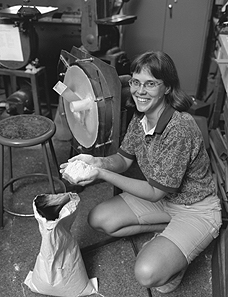
"I want to create a generation of engineers who are doers and active problem solvers," she says. "There is a history in international development of people going into the field with little technical background and coming up with things that are not effective. More and more, people are starting to recognize that problem-solving under the severe constraints of the developing world is difficult [and requires] real engineering skills." Inventor Amy Smith teaches at the Massachusetts Institute of Technology and served as a Peace Corps Volunteer in Botswana. Smith's efforts to get students involved extend well beyond the classroom. Working with MIT's Public Service Center, Smith cofounded the IDEAS (Innovation, Development, Enterprise, Action, Service) Competition, whose cash awards encourage students to develop and implement projects that make a positive change in the world. She also helped organize the International Development Network at MIT and assists in its annual student fair. This year, a record 50 groups took part, only two of which were spawned by D-Lab or IDEAS. Now she's plotting a month-long design fest this summer to spur visiting community leaders from developing countries to collaborate with student teams from MIT and elsewhere. Smith's approach to saving the world is pragmatic, much like her engineering philosophy. "There is a certain kind of engineering that I like to do," she says. "I don't like electricity and gadgetry. I simplify and simplify. None of my designs are complex. I always try to eliminate another part." She reduces problems to basic principles, hoping to uncover an equally basic solution. By keeping things simple, she increases the odds that her inventions will be adopted in poor countries.
Every fall Botswana RPCV Amy Smith, a senior lecturer at MIT, joins her students in a one-week assignment to live on $2 a day, to prepare for field trips to remote villages in places like Ghana, Honduras, and Zambia
The Pragmatist
Inventor Amy Smith '84, SM '95, ME '95, zeroes in on problems she can do something about--and teaches MIT students how to do the same.
By Carol Cruzan Morton
Amy Smith '84, SM '95, ME '95, knows firsthand about the hazards of indoor pollution. She'd learned that respiratory infections kill more children under five worldwide than any other disease--and that burning wood, dung, and other dirty household fuels is the major culprit. When the ever-practical mechanical engineer tackled the source of the problem, experimenting with a little Haitian cookstove on her front porch, she found that the smoke isn't great for adults, either. After tinkering with ways to make a clean-burning charcoal from common agricultural waste found in Haiti, she developed a racking cough.
At first she tolerated her affliction as another exercise in understanding the basic needs of the poorest rural people in developing countries. Every fall Smith, a senior lecturer at MIT, joins her students in a one-week assignment to live on $2 a day, to prepare for field trips to remote villages in places like Ghana, Honduras, and Zambia. But unlike the poverty exercise, being sick was hindering her efforts to change lives with simple technologies--and to provide hands-on training for students who share that ambition.
Smith (who eventually treated her lung infection with antibiotics) contends that in development work, such training is too often overlooked. "I want to create a generation of engineers who are doers and active problem solvers," she says. "There is a history in international development of people going into the field with little technical background and coming up with things that are not effective. More and more, people are starting to recognize that problem-solving under the severe constraints of the developing world is difficult [and requires] real engineering skills."
At MIT, Smith's ingenuity and vision have melded in a way that's both productive and inspiring. Equal parts inventor, coach, and envoy, she oversees the Edgerton Center's D-Lab, a series of four undergraduate courses focused on conceiving, designing, and disseminating technologies that serve the needs of developing countries.
"Amy is one of the leading bright lights [and] the most conspicuous leader in the effort to involve students in solving the vexing problems in developing countries," says Kim Vandiver, dean for undergraduate research and director of the Edgerton Center. "She really has a passion for how a little bit of help in the right place can make a huge impact in the quality of life for someone living in poverty."
Smith's efforts to get students involved extend well beyond the classroom. Working with MIT's Public Service Center, Smith cofounded the IDEAS (Innovation, Development, Enterprise, Action, Service) Competition, whose cash awards encourage students to develop and implement projects that make a positive change in the world. She also helped organize the International Development Network at MIT and assists in its annual student fair. This year, a record 50 groups took part, only two of which were spawned by D-Lab or IDEAS. Now she's plotting a month-long design fest this summer to spur visiting community leaders from developing countries to collaborate with student teams from MIT and elsewhere.
Such work couldn't be timelier. The 2006 report of the Task Force on the Undergraduate Educational Commons calls on MIT to help more students experience other parts of the world. D-Lab and the expanding menu of international-development projects sponsored by the Edgerton Center and the Public Service Center now make up one of three areas of international opportunity for MIT students. The other two--a classic study-abroad program and a long-standing international internship program--mostly involve developed countries. "A lot of our students would like to save the world," Vandiver says. "She's finding ways to help them do that."
Smith's approach to saving the world is pragmatic, much like her engineering philosophy. "There is a certain kind of engineering that I like to do," she says. "I don't like electricity and gadgetry. I simplify and simplify. None of my designs are complex. I always try to eliminate another part." She reduces problems to basic principles, hoping to uncover an equally basic solution. By keeping things simple, she increases the odds that her inventions will be adopted in poor countries.
This way of thinking inspired her phase-change incubator, which won the 1999 Collegiate Inventors Award. In places without modern lab facilities, travel incubators are often used to cultivate lab samples needed to test for microörganisms in water supplies or to diagnose infectious diseases. Most travel incubators run on electricity, so people typically try to figure out how to keep them running in countries without reliable sources of power. Smith took the question back one more step: how do you keep things warm? That led to the innovative heart of the incubator--Ping-Pong-sized balls filled with a chemical that emits a constant warming energy as it changes from a liquid to a solid state. To incubate water-testing samples or lab specimens, the balls are heated up in hot water or the sun to melt the chemical and placed in an insulated container, such as a plastic cooler, where they radiate body-temperature heat while solidifying. A doctor in Pakistan wants to use Smith's invention in vaccine trials. With help from a 2006 Innovation Grant from the MIT Deshpande Center, Smith is commercializing the incubator for use by governmental and nongovernmental organizations.
Smith's inventiveness has garnered acclaim: in 2000 she became the first woman to win the $30,000 Lemelson-MIT Student Prize, and she won a 2004 MacArthur "genius" grant for her work as an inventor and educator. But she confesses that little of her ingenuity gets applied at her Beverly home, a small renovated house originally built for factory workers. One casualty of her growing programs has been her personal tinkering time. "I would love to be the type of person who buys a fixer-upper, but recently I went without hot water for a month and a half," she says candidly.
Such work couldn't be timelier. The 2006 report of the Task Force on the Undergraduate Educational Commons calls on MIT to help more students experience other parts of the world. D-Lab and the expanding menu of international-development projects sponsored by the Edgerton Center and the Public Service Center now make up one of three areas of international opportunity for MIT students. The other two--a classic study-abroad program and a long-standing international internship program--mostly involve developed countries. "A lot of our students would like to save the world," Vandiver says. "She's finding ways to help them do that."
Smith's approach to saving the world is pragmatic, much like her engineering philosophy. "There is a certain kind of engineering that I like to do," she says. "I don't like electricity and gadgetry. I simplify and simplify. None of my designs are complex. I always try to eliminate another part." She reduces problems to basic principles, hoping to uncover an equally basic solution. By keeping things simple, she increases the odds that her inventions will be adopted in poor countries.
This way of thinking inspired her phase-change incubator, which won the 1999 Collegiate Inventors Award. In places without modern lab facilities, travel incubators are often used to cultivate lab samples needed to test for microörganisms in water supplies or to diagnose infectious diseases. Most travel incubators run on electricity, so people typically try to figure out how to keep them running in countries without reliable sources of power. Smith took the question back one more step: how do you keep things warm? That led to the innovative heart of the incubator--Ping-Pong-sized balls filled with a chemical that emits a constant warming energy as it changes from a liquid to a solid state. To incubate water-testing samples or lab specimens, the balls are heated up in hot water or the sun to melt the chemical and placed in an insulated container, such as a plastic cooler, where they radiate body-temperature heat while solidifying. A doctor in Pakistan wants to use Smith's invention in vaccine trials. With help from a 2006 Innovation Grant from the MIT Deshpande Center, Smith is commercializing the incubator for use by governmental and nongovernmental organizations.
Smith's inventiveness has garnered acclaim: in 2000 she became the first woman to win the $30,000 Lemelson-MIT Student Prize, and she won a 2004 MacArthur "genius" grant for her work as an inventor and educator. But she confesses that little of her ingenuity gets applied at her Beverly home, a small renovated house originally built for factory workers. One casualty of her growing programs has been her personal tinkering time. "I would love to be the type of person who buys a fixer-upper, but recently I went without hot water for a month and a half," she says candidly.
"Those were my kids he was talking about," she says. But what could she do? "I choose problems I can do something about," she says. "There are a whole bunch of problems I can't do something about, and I'm not working on them." She learned that better diagnosis and treatment of other, curable sexually transmitted diseases could slow HIV transmission by preventing the open sores that make it easier for HIV to enter the bloodstream. Her incubator technology, which had been one of many projects in the pipeline, became a top priority, since it could aid diagnostic testing that required growing cultures. (Smith's incubator is currently used in water-quality testing, but she hopes to have it deployed soon in the fight against AIDS.) That trip to Africa also motivated her to propose her first development class, Designs for Developing Countries, which she began teaching through the Edgerton Center in 1997, while she was a graduate student.
In 2000, she ditched her graduate studies for a job as a full-fledged instructor at the Edgerton Center. She then teamed up with Sally Susnowitz of the Public Service Center to apply for the grant that would provide the foundation for MIT's burgeoning development engineering programs. In fall 2002, she launched an undergraduate course called the Haiti Class. During the January Independent Activities Period, Smith took her students to Haiti to meet the people they were trying to help. The Haiti Class ultimately evolved into D-Lab (see "D-Lab at a Glance"). "Our sphere of influence is gradually getting bigger and hopefully will continue to do so," she says.
"Amy has bottomless energy," says friend and colleague Susan Murcott, a senior lecturer at MIT who works to improve water sanitation in Nepal. "And she conveys that enthusiasm to the students. She's a natural teacher. She doesn't have the answers. She engages in mutual exploration."
On a Tuesday in October, the introductory D-Lab classroom is packed. (As usual, this fall's course was oversubscribed: nearly 75 students vied in a lottery for 30 spots.) For the rest of the term, in addition to hearing Smith lecture on technology's appropriate and effective use in the developing world, students will team up to research specific community needs and develop technologies to address them. During the January interim session, most students will travel to far-flung countries and work with community partners to adapt their technologies to local conditions. Whatever trip you end up preparing for, Smith promises her students, "I guarantee you will work hard and come away happy with what you do."
Today, the students hear about potential projects in Brazil, Zambia, Tanzania, and India. Last week, they learned about communities in Guatemala, Ghana, Lesotho, China, and Honduras, where Smith's idea for using toilet tank technology to ensure a steady supply of safe, chlorinated water has been embraced and improved by local plumbers; it's already spread to dozens of water treatment systems. Though Smith's MIT uniform consists of jeans and sweaters, slides from her trips show her in her traveling wardrobe. In the villages, she often wears what she calls her "development dresses" as a sign of respect for community leaders.
Smith tries to keep her life as simple as her inventions. She owns no car, commutes by train, and takes a break from work on weekends to paddle her inflatable kayak. Her growing program budget rests on the shaky foundation of grant money, annual fund-raising, and the faith that both will continue. "Everything we do is on a shoestring," she says. "I like operating that way."
Promoted to senior lecturer in mechanical engineering this year, Smith has reached the top of the nontenured ladder and professes no further academic ambitions. With her increasing administrative responsibilities, she now sometimes spends whole days in meetings instead of brainstorming simpler technologies with students. "I still want to be a teacher," she says. "I want to be an inventor. My favorite thing in the world is to go to villages and talk about the issues they have."
When the world's problems seem too overwhelming, Smith recalls the words of activist Catholic priest Daniel Berrigan: "One cannot level one's moral lance at every evil in the universe. There are just too many of them. But you can do something, and the difference between doing something and doing nothing is everything."
D-Lab at a Glance
Amy Smith's D-Lab has matured into a series of four undergraduate courses offered through the Edgerton Center:
D-Lab I offers an overview of conventional development and why it hasn't helped poor communities, introduces the concept of appropriate design, and prepares students for trips to communities in developing countries during the January Independent Activities Period (IAP).
D-Lab II students work on the engineering problems they identified during their IAP trips.
D-Lab III covers the challenges of disseminating a proven technology so that it actually helps people.
D-Lab IV students develop promising prototypes into
field-ready products.


















